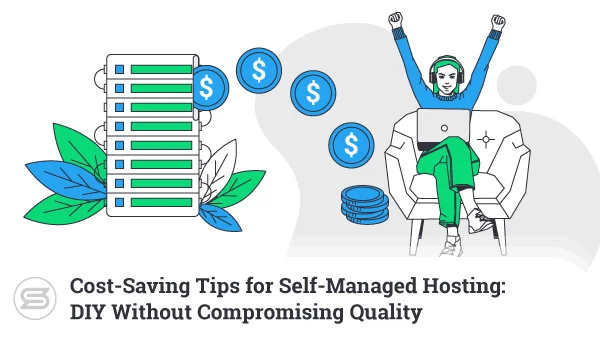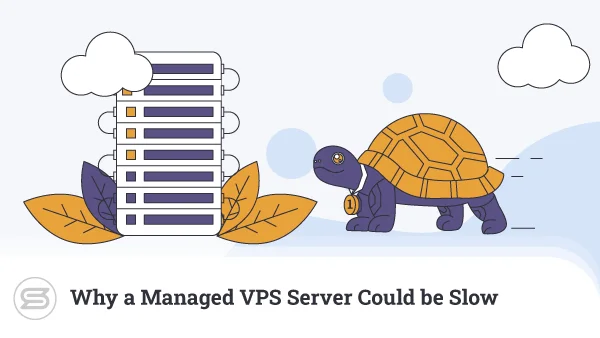Virtual private servers are a hot commodity these days — you can often find telecoms, healthcare organizations, and retail businesses taking advantage of different VPS solutions.
The standard VPS plan offers much better performance and security than shared hosting while keeping prices significantly lower than dedicated servers. When you add the enhanced scalability and advanced customizations in the mix, you already have a solution powerful enough to handle pretty much anything.
Not everyone can be a techie or afford to hire a dedicated admin to manage things. The average business owner naturally prefers to concentrate on growth and development while leaving the technicalities to the professionals.
This is where managed services come into play.
What is a Managed VPS?
Managed VPS platforms are the perfect choice for startups and SMBs that don’t have an in-house IT team. Reliable hosting providers already have the workforce — experts in the field that pass through rigorous training processes.
In the standard scenario, your host supplies the physical server, sets it up with a default OS and control panel, and hands all control over to you. But what about all the software installations, updates, technical questions? There are just so many things that can go wrong.
Managed virtual private server clients have nothing to worry about, though — trained professionals handle all these delicate operations for them.
Let’s see just how deep the scope of the managed support services can go.
What do Managed VPS Services Include?
Different hosts can give you a different answer to that question.
Some will say that server maintenance, and software updates are enough to call a VPS service “managed.” Others believe that security audits and malware removal should also be part of the service. There are even those who are prepared to assist in development requests.
The only way to be sure exactly how much your host can assist in managing your VPS server is to contact them beforehand. A pre-sales conversation can shed light on all uncertainties.
What is the scope of the support team? How can you contact them? Do they work 24/7? Who is responsible for software installations and updates?
Getting these details beforehand is the only way to be completely sure of what to expect.
By default, most of the common managed VPS plans include the following:
- Uptime guarantee
- Server provisioning and initial setup
- Control panel and server management tools
- Security software installation
- Regular updates and vulnerability patches
- Offsite server backups
- On-demand malware scans
- Hardware and software issue resolution
- Round-the-clock support availability
As you can see, a reliable virtual server provider can take a significant load off your shoulders, especially security-wise.
You can check our detailed review on managed VPS security for more information.
Realizing the need for prompt and well-supported services is a great first step, but the market is swarming with hosting providers, and they all want your business. You need a careful research to guarantee you pick the right one.
How to Choose a Managed VPS?
Finding a trustworthy partner to help you with your VPS venture is essential. Don’t just rush into the first lucrative deal you see — there are a few other factors to consider first:
Features
Go through each host’s list of features and see which will directly help with your project. Analyze the rest as well — many times, there are future needs you might have not even considered.
Resources & Scalability
Start with the RAM and CPU as they are the core that powers your VPS machine. Check if you have enough storage space and monthly bandwidth as well. Utilizing SSD drives is highly recommended.
Make sure you have room to grow. The best managed VPS providers all scale easily, letting you add or remove resources on a per-need basis.
Performance
You can check your potential host’s speeds even before you become a client. Best if your provider offers a free trial or demo tour — simply sign up, put up a simple page online, and test its performance with a third-party tool like GTMetrix or Pingdom. Make a few tests to avoid false positives.
Uptime is a little trickier as you need a longer period of time to inspect it. Still, you can always check some existing client reviews and ensure there is a clear refund policy in case of unexpected downtimes.
Ease of Use
Especially useful if this is your first time with a managed VPS, or you simply lack the technical knowledge to operate one. Again, many hosts will allow you to test the interface and navigation, so you can ensure your hosting choice will suit you perfectly before you make any investments.
Support
This is often the most crucial factor. Any provider can offer 24/7 support, but very few actually do it right. We strongly suggest you engage in pre-sales conversations with your potential picks as this will give you a good general idea of the assistance you’ll get as a client.
Is the support 24/7? How fast do they respond? Are they knowledgeable enough to help with more complex issues? Are the operators trying to understand your case or resort to pushing links and canned responses?
Those are just a few of the questions you can ask to determine the level of your managed VPS support.
Price
Virtual servers are generally more expensive than shared hosting, but the price difference is getting thinner by the day. Still, don’t just look for the lowest rates, the more important thing is the feature-cost ratio, what you’re actually getting for your dollars.
It is all about your needs – you wouldn’t get a 16 CPU core, 12 GB RAM machine to support a small business page, neither will you need enhanced e-commerce functionalities if you’re not running an online shop.
Define your goals and the path to reach them — your managed VPS provider can help with the rest.


Final Takes
Managed VPS hosting is growingly popular for a reason.
From the performance boost and enhanced security to the hands-on approach to support — we have an all-round solution that serves both smaller businesses and large enterprises easily. Scaling your CPU, RAM, or server space is another big plus as it gives you the flexibility and control to handle growing demands. You can forget about overpaying as the costs are often tied to your resource consumption.
Want to know how Scala Hosting deals with Managed Cloud VPS services? Take a look at our latest offers.
FAQ
Q: What is VPS management?
A: Signing up for a VPS means you’re getting a virtual server set up and working for you. But there are so many other things to consider — software installations, updates, monitoring, security, backups, technical issues.
VPS management encompasses all of the above plus any related operations. You can choose to take care of that by yourself (unmanaged VPS) or with the help of your host’s support (managed VPS).
Q: What is the difference between managed and unmanaged VPS?
A: Choosing an unmanaged or managed VPS often boils down to the level of assistance you need:
- Unmanaged services are often more affordable and give you much more control over the environment, but you’re entirely responsible for managing your server.
- Managed services come with the expert support of your host and its full dedication to the smooth running of your VPS.
Q: What can I do with my VPS?
A: A lot of websites can find good use of a VPS, because of its adaptive environment and excellent performance under stress. You can safely run smaller personal projects, but more complex projects are fully welcome as well. Run VoIP servers, host IoT devices, or deploy a private cloud — there are very few limits to the power of a reliable VPS.
What is a VPS – Everything you need to know!



